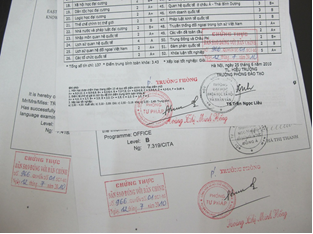From January 2021, provinces and cities have implemented the issuance of chip-mounted citizen ID card in Vietnam. Below are the latest information on chip-based Citizen ID Cards that citizens need to know.

1. What are benefits for citizens using chip-mounted citizen ID cards?
According to Major General To Van Hue, Chief of the Administrative Management Police Department for Social Order (C06, Ministry of Public Security), the use of chip-mounted citizen ID cards has several advantages over the current barcode-based citizen ID cards. To be specific:
- The chip-based citizen ID cards has higher security and can store more information. The chip card can also integrate information from other entities such as insurance, driver's license, or other personal information;
- When transitioning from a barcode card to a chip-based card, citizens only need to replace the information storage device, with the basic card number remaining unchanged, thus transactions are not affected;
- The new citizen ID cards can store biometric data, personal information, digital signatures, and other identifications, making it very difficult to counterfeit; Additionally, the chip used in the national ID card complies with global and Vietnamese security regulations. The chip has a digital signature and can store biometric data (fingerprints), and personal information for authentication, making forgery very difficult;
- The information about the chip-based citizen ID card holder is precisely identified, minimizing all risks of forgery. Therefore, the new national ID card is very secure in terms of confidentiality, especially in financial transactions;
- Furthermore, identity verification can be performed offline without needing an internet connection.
2. Not Mandatory for All Citizens to Switch to Chip-Based CCCDs Before July 1, 2021
According to Clause 2, Article 38 of the 2014 Law on Citizenship Identification, ID cards issued before January 1, 2016, remain valid until their expiration date as prescribed.
According to Article 2 of Decree 05/1999/ND-CP, ID cards are valid for 15 years from the date of issuance.
Additionally, Clause 2, Article 4 of Circular 06/2021/TT-BCA states that citizen ID cards issued before January 23, 2021, remain valid until their expiration date as prescribed.
Thus, according to these regulations, the law does not mandate all citizens to switch from their current ID/CCCD to a chip-based citizen ID card immediately if these documents are still valid. Only when these documents expire are citizens required to switch to the chip-based CCCD. However, if citizens request to switch to a chip-based citizen ID card before their ID/citizen ID cards expires, the request will be accommodated.
In Ho Chi Minh City, at a press conference on March 18, 2021, Lieutenant Colonel Huynh Thi Thu Trang, Deputy Chief of the Administrative Management Police Department for Social Order (PC06) stated that from January 1 to July 1, chip-based citizen ID cards would be issued to individuals 14 years and older who have not been issued a citizen ID card, those using 9-digit ID cards, and individuals with expired, lost, or changed information on their 12-digit citizen ID cards or ID card. Initially, the police will issue CCCDs to residents with permanent residency in Ho Chi Minh City; after July 1, they will issue CCCDs to temporary residents.
3. What Should Citizens Bring When Switching to Chip-Based CCCDs?
When switching to a chip-based citizen ID card, citizens should bring their household registration book, barcode-based citizen ID card, or 9-digit and 12-digit ID cards currently in use to the county-level police department, provincial-level police department, or the citizen ID card management department of the Ministry of Public Security.
To be issued a valid chip-based citizen ID card, citizens must fully supplement crucial information in the household registration book, especially details such as date of birth, place of origin, ethnicity, nationality, etc. Therefore, citizens need to check and verify the information in their household registration book. If the information is incomplete or inaccurate, they should contact the police department where they registered for residency to correct and supplement the information before applying for a chip-based CCCD.
In Ho Chi Minh City, the Administrative Management Police Department for Social Order (PC06) stated at the citizen ID card issuance centers, citizens only need to provide personal information. Officials will extract data from the citizen ID card issuance software to carry out the issuance procedure. Citizens do not need to fill out or sign any papers as required in the previous barcode citizen ID card issuance process (unless the citizen's information is not available in the residency data, or there are changes or corrections to the information). Citizens only need to present their household registration book, ID card/CCCD, and legal documents if their residency data is missing or if there are changes or corrections to their personal information.
4. How Is the Procedure for Switching to Chip-Based CCCDs Conducted?
The procedure for switching to a chip-based citizen ID card is as follows:
Step 1: The citizen fills out the Citizen Identification Form (either in person or online).
Step 2: The citizen presents the previously issued citizen ID card or ID card.
Step 3: The citizen pays the citizen ID card issuance fee as prescribed.
Step 4. The citizen ID card management official issues a receipt for the citizen ID card card to the applicant.
Step 5: Receive the results at the application submission location or by postal service.
Note:
- If a citizen already has a 12-digit ID/citizen ID card, when switching to a chip-based CCCD, the number remains unchanged. This will not affect future transactions of the citizen.- Citizens using old 9-digit ID cards will switch to a 12-digit chip-based citizen ID card. This change in citizen ID card number will be confirmed by competent authorities in the household registration book or with a confirmation certificate indicating the change in ID number.
5. Fees for Issuing or Reissuing Chip-Based CCCDs in 2021
According to Article 1 of Circular 112/2020/TT-BTC, from January 1, 2021, to June 30, 2021, the fee for issuing Citizenship Identification (CCCD) cards will be 50% of the fee prescribed in Article 4 of Circular 59/2019/TT-BTC dated August 30, 2019, by the Minister of Finance regulating the collection, policies, submission, and management of the Citizenship Identification card issuance fees.
Thus, the fee schedule for issuing chip-based citizen ID cards from January 1, 2021, to June 30, 2021, is as follows:
- Citizens transitioning from 9-digit ID cards or 12-digit ID cards to Citizenship Identification cards: VND 15,000 per card.
- Reissuing citizen ID cards due to damage, change of information (surname, middle name, name), distinguishing features, gender reassignment, place of origin, data errors, or upon citizen request: VND 25,000 per card.
- Reissuing citizen ID cards due to loss, reinstatement of Vietnamese nationality according to the Law on Vietnamese Nationality: VND 35,000 per card.
After this period, from July 1, 2021, onwards, the fee for issuing CCCDs will follow the regulations in Article 4 of Circular 59/2019/TT-BTC, specifically:
- Citizens transitioning from 9-digit ID cards or 12-digit ID cards to Citizenship Identification cards: VND 30,000 per card.
- Reissuing citizen ID cards due to damage, change of information (surname, middle name, name), distinguishing features, gender reassignment, place of origin, data errors, or upon citizen request: VND 50,000 per card.
- Reissuing CCCD cards due to loss, reinstatement of Vietnamese nationality according to the Law on Vietnamese Nationality: VND 70,000 per card.
6. What Is the Timeline for Issuing a Chip-mounted citizen ID card in Vietnam?
According to Article 25 of the 2014 Law on Citizenship Identification, from the date of receipt of the complete application as prescribed, the Citizenship Identification management agency must issue the Citizenship Identification card to the citizen within the following timeframes:
- Cities or district-level towns: no more than 7 working days;
- Mountainous, highland districts, border areas, islands: no more than 20 working days;
- Other areas: no more than 15 working days.
7. Where Can Citizens Apply for a Chip-mounted citizen ID card in Vietnam?
According to Article 26 of the 2014 Law on Citizenship Identification, citizens can choose one of the following places to apply for a chip-based citizen ID card:
- Citizenship Identification management agency of the Ministry of Public Security;
- Citizenship Identification management agency of the provincial-level or centrally governed city police;
- Citizenship Identification management agency of the district-level, municipal, district-level town, city within a province, or equivalent administrative unit police;
- Citizenship Identification management agency authorized to conduct Citizenship Identification card issuance procedures at the commune-level town, ward, commune, agency, unit, or at the citizen's residence in necessary cases.
- Key word:
- citizen ID card
- Vietnam
 Article table of contents
Article table of contents













